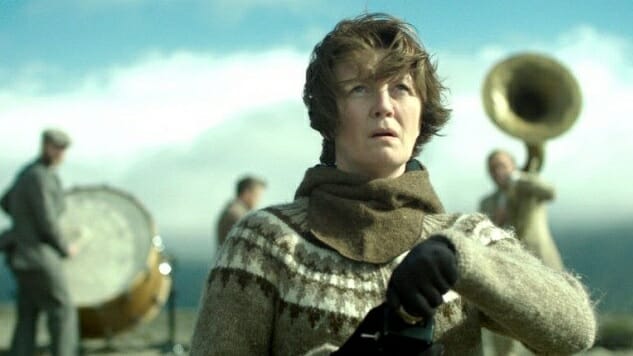Woman at War

Let Benedikt Erlingsson’s Woman at War teach his peers a valuable lesson: Movies need more Greek choruses. In Erlingsson’s case, that’d be an Icelandic chorus, shadowing choir conductor and amateur eco terrorist Halla (Halldóra Geirharðsdóttir) as she carries out her one-woman campaign against metal and mining corporation Rio Tinto. She’s a tenacious, clever foe, loosing arrows over power lines to cut electricity to the company’s aluminum plants, job producers to some, warts upon Iceland’s pristine landscapes to others, meaning mostly to Halla. The band following her as she goes about her business never comments on her actions in words, just in music.
Maybe they’re on Halla’s side. Rio Tinto’s industrial impact on the gorgeous Icelandic expanse lovingly captured by Erlingsson’s cinematographer, Bergsteinn Björgúlfsson, is offensive to the eye. Maybe they’re appalled by Halla’s motivations, muddied by both her virtue and her selfishness. It’s possible that fighting for a greener world in Halla’s way, causing havoc for the ostensible greater good, incurs consequences that extend beyond Rio Tinto. In Woman at War’s opening scene, her meddling causes literal sparks to fly. Lights flicker inside the company plant as workers scramble to fire off generators and avoid imminent catastrophe. Abruptly shutting off power to a building that houses a directional drill isn’t a victimless crime.
Woman at War takes no firm position on matters of environmentalism, which is to the film’s benefit. Halla’s crusade against the rape of Iceland’s natural beauty is noble. “I know these people,” exclaims Baldvin (Jörundur Ragnarsson), Halla’s ministry man on the inside during one surreptitious meeting. “I’m surrounded by those psychopaths all day long.” Perhaps unsurprisingly, her deeds have attracted attention on a global scale, forcing the hand of other companies interested in laying down roots in Iceland to reconsider. That’s the good news. The bad news is that Halla’s civil disobedience and property destruction have put her on radars. Authorities aren’t on to her. They just know somebody out there has a grudge against Rio Tinto.
Baldvin reminds Halla, and the audience, that Rio Tinto is run by bad people, and so she remains the hero. Yet, the chorus scores her plots and plans with encouragement as much as with judgment. Halla routinely evades the long arm of the law, but justice has to grab someone, and that someone, nearly without fail, is Juan Camillo (Juan Camillo Roman Estrada), a tourist with a knack for being in the wrong place (the site of one of Halla’s crimes) at the wrong time (the moment the police swoop in to arrest her).